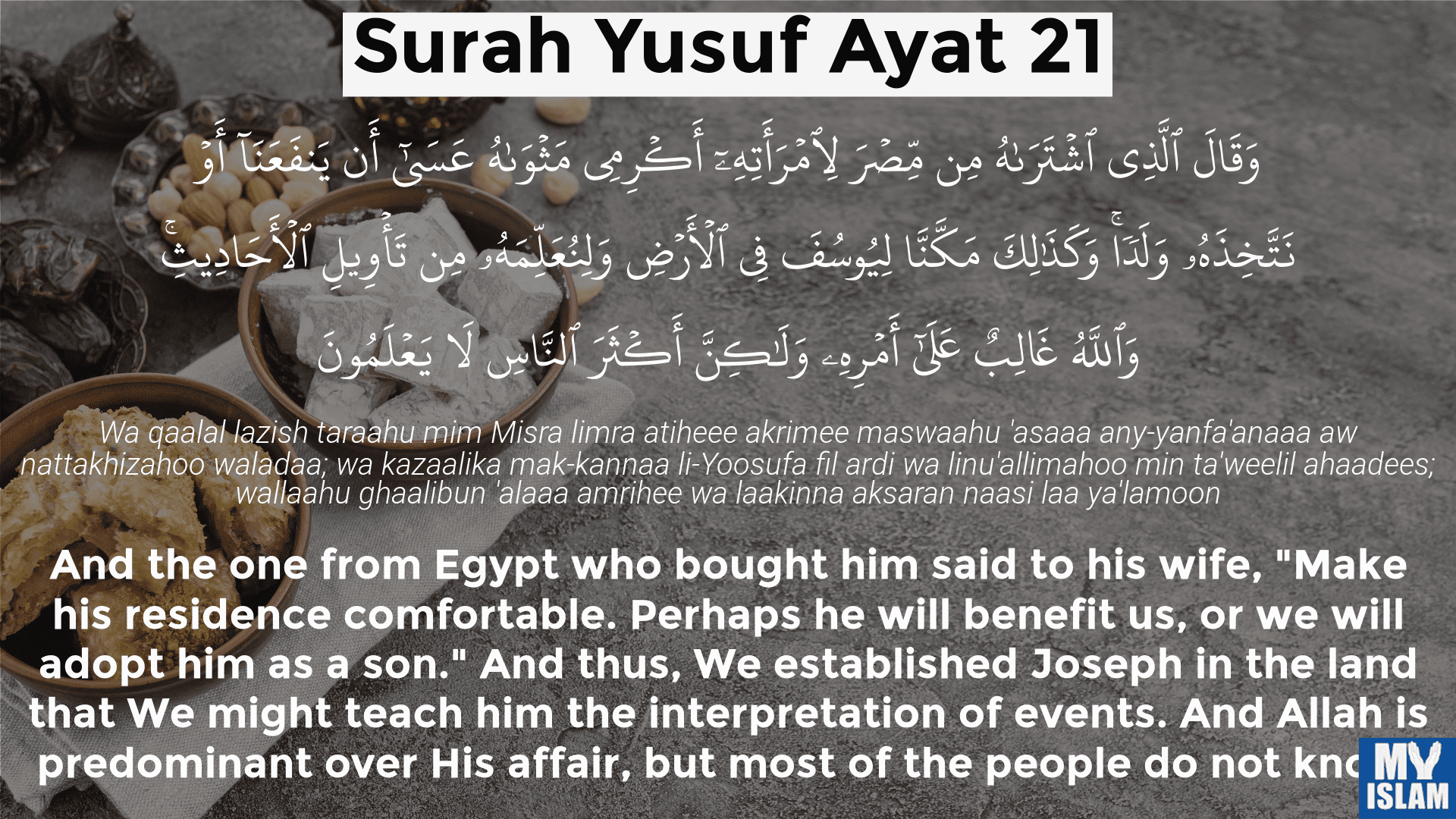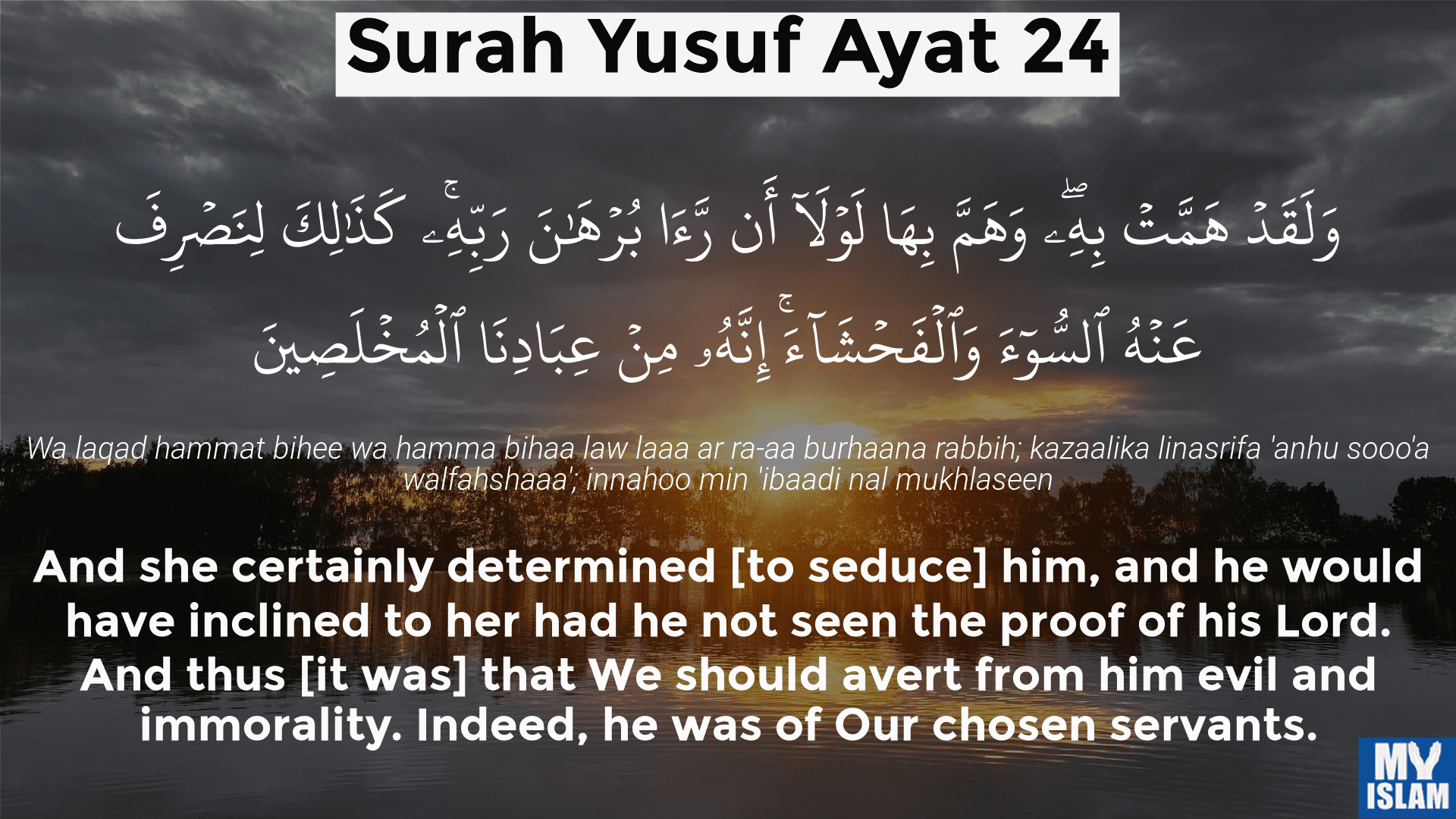Surah Yusuf Ayat 21 in Arabic Text
English Translation
Here you can read various translations of verse 21
And the one from Egypt who bought him said to his wife, “Make his residence comfortable. Perhaps he will benefit us, or we will adopt him as a son.” And thus, We established Joseph in the land that We might teach him the interpretation of events. And Allah is predominant over His affair, but most of the people do not know.
The man in Egypt who bought him, said to his wife: “Make his stay (among us) honourable: may be he will bring us much good, or we shall adopt him as a son.” Thus did We establish Joseph in the land, that We might teach him the interpretation of stories (and events). And Allah hath full power and control over His affairs; but most among mankind know it not.
The man from Egypt who bought him said to his wife: “Take good care of him, possibly he might be of benefit to us or we might adopt him as a son.” Thus We found a way for Joseph to become established in that land and in order that We might teach him to comprehend the deeper meaning of things. Allah has full power to implement His design although most people do not know that.
And he (the man) from Egypt who bought him, said to his wife: “Make his stay comfortable, may be he will profit us or we shall adopt him as a son.” Thus did We establish Yusuf (Joseph) in the land, that We might teach him the interpretation of events. And Allah has full power and control over His Affairs, but most of men know not.
And he of Egypt who purchased him said unto his wife: Receive him honourably. Perchance he may prove useful to us or we may adopt him as a son. Thus we established Joseph in the land that We might teach him the interpretation of events. And Allah was predominant in His career, but most of mankind know not.
And he who traded him, being of Misr, (Egypt) said to his wife, “Give him honorable lodging; it may be that he will profit us, or it may be that we take him to ourselves (as) a son.” And thus, We established Yûsuf (Joseph) in the land, and that We may teach him some of the interpretation of 115 discourses. And Allah is Overcomer with (Literally: Over) His Command, but most men do not know.
The Egyptian who bought him said to his wife, ‘Look after him well! He may be useful to us, or we may adopt him as a son.’ In this way We settled Joseph in that land and later taught him how to interpret dreams: God always prevails in His purpose, though most people do not realize it.
مصر والوں میں سے جس نے اسے خریدا تھا اس نے اپنی بیوی سے کہا کہ اسے بہت عزت واحترام کے ساتھ رکھو، بہت ممکن ہے کہ یہ ہمیں فائده پہنچائے یا اسے ہم اپنا بیٹا ہی بنا لیں، یوں ہم نے مصر کی سرزمین میں یوسف کا قدم جما دیا کہ ہم اسے خواب کی تعبیر کا کچھ علم سکھا دیں۔ اللہ اپنے ارادے پر غالب ہے لیکن اکثر لوگ بے علم ہوتے ہیں
Quran 12 Verse 21 Explanation
For those looking for commentary to help with the understanding of Surah Yusuf ayat 21, we’ve provided two Tafseer works below. The first is the tafseer of Abul Ala Maududi, the second is of Ibn Kathir.
Ala-Maududi
(12:21) The man[16] from Egypt who bought him said to his wife[17]: “Take good care of him, possibly he might be of benefit to us or we might adopt him as a son.[18] Thus We found a way for Joseph to become established” in that land and in order that We might teach him to comprehend the deeper meaning of things.[19] Allah has full power to implement His design although most people do not know that.
16. According to the Bible his name was Potiphar. But the Quran mentions him merely by the title (Al-Aziz). As the Quran uses the same title for Prophet Joseph, when he rose to a high rank, it appears that the person held a high office or rank in Egypt, for the word Aziz stands for a powerful person who cannot be opposed and disobeyed. The Bible and the Talmud say that he was an officer of Pharaoh’s body guards and captain of the guard. And according to a tradition from Ibn Abbas, related by Ibn Jarir, he was the officer of the royal treasury.
17. According to the Talmud the name of his wife was Zuleikha and she is known by the same name in the Muslim traditions. As regards to the other tradition among the Muslims that Prophet Joseph married her afterwards, it is neither based on the Quran nor on the history of the Israelites. And the fact is that it is below the dignity of a Prophet to have married such a woman about whom he had personal knowledge that she was of a bad character. And this opinion is confirmed by this general statement of the Quran: Women of bad character are for men of bad character and men of bad character are for women of bad character. And the women of pure character are for men of pure character, and the men of pure character for the women of pure character. (Surah An-Noor, Ayat 26).
18. The fact that Potiphar had a very high opinion of Prophet Joseph from the very beginning is also confirmed by the Talmud and the Bible. The Talmud says that at this time Joseph was about eighteen years of age (and) Potiphar was very favorably impressed with his bearing and appearance. So he came to the conclusion that he belonged to some noble family and had been made a slave by the force of adverse circumstances. When the Midianites carried him before Potiphar, he said: He does not look like a slave and I fear he has been stolen from his country and his home. That is why Potiphar did not treat him like a slave, but put him in charge of his house and all his possessions. Likewise the Bible says: And he left all that he had in Joseph’s hand; and he knew not ought he had, save the bread which he did eat. (Gen. 39: 6).
19. This verse alludes to the special training Prophet Joseph needed at that time for the performance of the duties of the high rank to which he was destined to rise. Up to that time, he had been brought up in the desert, under the environment of a semi nomadic life of a shepherd. There was neither any settled state in Canaan and Northern Arabia nor had there been any appreciable progress in culture and civilization, for it was inhabited by different independent clans with no settled government. Thus it is obvious that the training that Prophet Joseph had received in Canaan, had equipped him with the good characteristics of nomadic life coupled with the qualities of God worship and high morality of the family of Prophet Abraham. But this was not enough to enable him to direct the affairs of Egypt, which was at that time one of the most cultured and civilized countries of the known world and required a different experience and training for the conduct of its affairs. The All Powerful Allah made arrangements for this training and sent him to the house of an officer of a very high rank in Egypt, who entrusted him with full powers over his house and estate. This enabled him to develop all those latent abilities that were needed to fulfill his destiny, and he gained the experience that was required for the efficient conduct of the affairs of the kingdom of Egypt in the years to come.
Ibn-Kathir
21. And he (the man) from Egypt who bought him, said to his wife: “Make his stay comfortable, maybe he will profit us or we shall adopt him as a son.” Thus did We establish Yusuf in the land, that We might teach him the interpretation of events. And Allah has full power and control over His affairs, but most of men know not. 22. And when he ﴿Yusuf﴾ attained his full manhood, We gave him wisdom and knowledge (the prophethood), thus We reward the doers of good.
Allah mentions the favors that He granted Yusuf, peace be on him, by which He made the man from Egypt who bought him, take care of him and provide him with a comfortable life. He also ordered his wife to be kind to Yusuf and had good hopes for his future, because of his firm righteous behavior. He said to his wife,
(Make his stay comfortable, maybe he will profit us or we shall adopt him as a son.) The man who bought Yusuf was the minister of Egypt at the time, and his title was `Aziz’. Abu Ishaq narrated that Abu `Ubaydah said that `Abdullah bin Mas`ud said, “Three had the most insight: the `Aziz of Egypt, who said to his wife,
(Make his stay comfortable…), the woman who said to her father,
(O my father! Hire him…), ﴿28:26﴾ and Abu Bakr As-Siddiq when he appointed `Umar bin Al-Khattab to be the Khalifah after him, may Allah be pleased with them both.” Allah said next that just as He saved Yusuf from his brothers,
(Thus did We establish Yusuf in the land), in reference to Egypt,
(that We might teach him the interpretation of events.) the interpretation of dreams, according to Mujahid and As-Suddi. Allah said next,
(And Allah has full power and control over His affairs,) if He wills something, then there is no averting His decision, nor can it ever be stopped or contradicted. Rather, Allah has full power over everything and everyone else. Sa`id bin Jubayr said while commenting on Allah’s statement,
(And Allah has full power and control over His affairs,) “He does what ever He wills.” Allah said,
(but most of men know not.) meaning, have no knowledge of Allah’s wisdom with regards to His creation, compassion and doing what He wills. Allah said next,
(And when he attained), in reference to Prophet Yusuf, peace be upon him,
(his full manhood), sound in mind and perfect in body,
(We gave him wisdom and knowledge), which is the prophethood that Allah sent him with for the people he lived among,
(thus We reward the doers of good.) because Yusuf used to do good in the obedience of Allah the Exalted.
Quick navigation links






